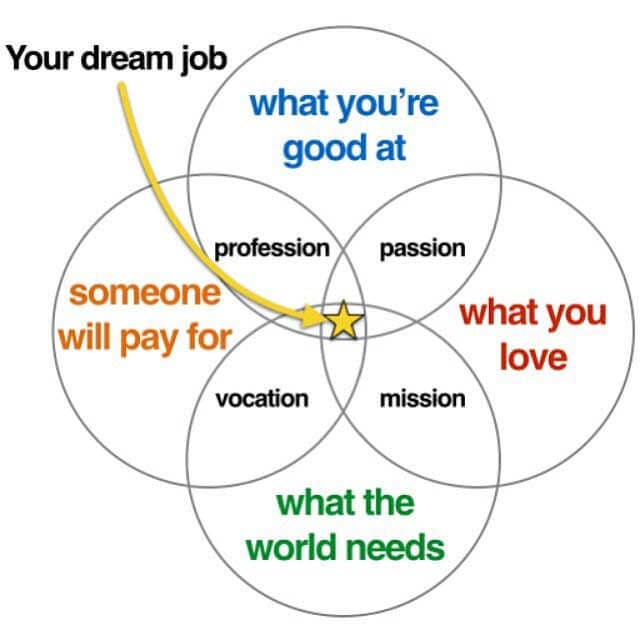Updated April 20, 2023
Dream Job (Easy)
A dream job is not as elusive as it appears to be. A dream job remains a dream for most people because they don’t define what a dream job means for them. So you need to do a lot of souls searching, a lot of biting the tongue, and a lot of going back and coming forward. But it’s possible to make a living doing what you love and earn handsomely.
According to Maslow’s Hierarchy of Needs, the basic needs of a human being are to put food on the table, have shelter for warmth and rejuvenation, and clothes to wear. To earn basic needs, man doesn’t need to do much. S/he can have a mediocre job and earn as much as to cover his basic needs. But a dream job doesn’t connote the first rung of hierarchy needs. Rather, it’s about the fourth and fifth – the self-esteem and self-actualization need.
While talking about reaching your full potential and searching for your dream job, New York-based serial entrepreneur and author Jonathon Fields says that Maslow has missed one need which should even come before the basic needs of physiological and safety, and that is the need of not changing. People are scared of change. They know every bit and piece of information to improve their lives. But what stops them is their resistance to change. If people are less resistant to change, they can achieve what they are meant to.
What would be the solution, then? How do you convince people to change their mindset about their potential and not waste it to earn only a mediocre living? And how it’s relevant to finding your dream job?
Here’s how.
Once people are not resistant to change, they can take the mental leap of changing their security mindset and can aim for bigger things. They can reach their limit, and their limit will expand. And one day, when they are at the threshold of going beyond their comfort zone, their dream job will appear. No, a job won’t suddenly transmute itself into something ludicrous, but it will transform to perform the jobs that once seemed beyond its capability.
Want to know how?
Hang on.
If you read this article through and through, one thing you will learn – you are more than you are currently expressing. It’s as useful to people just starting out in their careers as it is to people who have already achieved significant success.
1st Step: Define your dream job. Define yourself.
The first step is critical; most people seem to gallop it to reach the next step. Same logic you need to use here. Before knowing what color of hat you love to wear, how would you buy it? Before knowing your values and passions, what turns you on and what turns you off, how would you know what your dream job would look like? And if you don’t know your dream job, how would you find a job?
You need to ask yourself a series of questions before you come to a solution about what your dream job would look like. Your dream job list could consist of the following:
- What’s your favorite pastime?
- What do you miss doing most?
- What are your values? (Meaning what characteristics you base your decisions on)
- In the past, if you ever had a job, what did you like in that job? What did you dislike?
- What do you do when you have a sudden day off?
- If you have a dream job right now, why do you think this particular job is your dream job?
- What are your passions?
- What legacies would you like to leave behind?
When writer and founder of Mindtree, Subroto Bagchi was asked why he writes, he said – I write because I love to write. I have a deep longing to share what I have learned with people who are yet to learn things about life.
And mind you, Subroto Bagchi, Jonathan Fields, people who found their utopia didn’t see them overnight. They kept asking themselves and trying new things, and suddenly they found the alignment between their job hunting and passion.
You also can find what your dream job is if you search. Search obsessively. Ask yourself several questions. Write the answers. Talk to people who are from different career backgrounds. Read. Attend seminars. Take notes. Try new things. One day you will see you have found your item, which inspires you to get up early in the morning to welcome the day with open hands.
2nd Step: Wear a black hat
You may wonder why to wear a black hat out of a sudden. If you have read “Six Thinking Hat” by Edward de Bono, you would know that a black hat signifies the obstacles on the path. Once you define your dream job essay, you must see whether it’s scalable. Your dream job may be anything from writing to cartooning on the back of a card. But if you don’t articulate what possible hindrances you may face, you wouldn’t be able to handle them when they appear.
Source: pixabay.com
Ask yourself these questions –
- Does my dream job quiz solve any problems in society?
- What obstacles may I face while pursuing my dream job game?
- How to deal with family pressure and societal pressure?
- Do I have enough savings to start afresh on a new career?
While embarking on a dream job, the common pitfall is the resistance of other people for you to change. You would see that your family will often pose a more serious obstacle than anyone else because your family doesn’t want you to change, so they don’t want to change their behavior toward you. To convince your family, you need to show them that you are not putting them in any bottleneck and you have enough savings to make it through.
Once you convince your family, it will be easier to pursue whatever you want.
3rd Step: Don’t quit your current career yet
If you find out that the job you are pursuing is not your dream job, don’t quit immediately. See, your job pays your bill, puts the food on the table, and accommodates your family and all the expenses you have for yourself. So, quitting immediately is foolish. Rather plan. Always remember that you need to have enough money in the bank for you and your family to run on if you don’t do a thing for a year and some more.
For example, Robin finds out that writing is his passion. And he wants to pursue it with all his heart. But right now he is a recruitment consultant in a consulting firm. He earns well, and his family depends on it. So here, Robin needs to plan. He needs to ask himself –
- How much must I save every month to quit within a year?
- The amount I have set aside for family expenses, can I pare it down by 10-20%?
- How much money do I need to save so that if I don’t get paid for a year or so, I don’t need to worry about my family expenses?
Yes, it’s important to pursue your dream job, but at the same time, you need to do some reality checks. Things look good in appearance, but to know what they are. You need to dig deep and see.
4th Step: Dig deep and research your dream job
Let’s extend the example of Robin, who has realized that he loves to write. Now, he knows that he loves to write and has enough evidence to do the same and earn well. But that is what he thinks. It may not be true for him.
In this case, he needs to go to the market and do some due diligence. As a beginner, he needs to go to different job sites and find out how much money he can charge per article. He also needs to know whether his writing skill is efficient enough to earn him a job as a writer.
The best way to start your dream job search is to take a ready, fire, aim approach. Here, Robin needs to apply for a freelance writing gig. He can choose anything, to begin with. Then see for himself what his experience is and gradually expands his direction.
5th Step: Start a part-time venture
Robin has fired his arrow and sees he is good enough to earn a living from his writing. But he is yet to quit his day job.
It’s better not to quit the day job yet. Rather it would be prudent if he takes some time and thinks about how to take some time for his freelance writing career. Maybe 2-3 hours a day after office hours or 8-10 hours at the weekend.
While you are still a newbie in a market, it is worth more time to see whether you can continue it for a long time and whether it’s giving you as much happiness as you had thought it would. If so, you can transform your part-time journey into a full-time affair or continue with your current day job.
So, hang on there, do some work part-time, and then see whether it rings a bell.
 Source: http://exameangola.net/
Source: http://exameangola.net/
6th Step: Set an earning goal
You need to think that with time the value of money will decrease. So whatever you earn in your day job now wouldn’t be enough two years from now. Strategize by adding 20% of your current income.
For example, if you get a salary of Rs. 50,000 per month, two years from now, you must earn at least Rs. 60,000 to suffice.
Thus, while pursuing your part-time venture, you need to set a goal to make at least similar or 20% more than whatever you are making now. Yes, you need to do some tweaks and find out more time per week or month to see whether it’s possible.
If, within a year, you find out that it’s easily doable, then you can gradually plan to quit your day job and start your new career full-time.
If not, you can continue to do your day job and simultaneously pursue your dream job part-time if it seems worthwhile.
7th Step: Scalability is a major part
Most passionate people think that everything is scalable. But quite often, it is seen that everything is not scalable all the time. Thus, you may love to do certain work, but it may not pay you enough to quit your current job. But that doesn’t mean you shouldn’t pursue them. Pursue your passion with all your heart, but remember that you have responded if you have a family. And to find freedom for your love, you need to take responsibility to earn enough to run your family well and save some.
Business philosopher Jim Rohn remarked –
Do the things you have to do quickly, so that you can do the things you love to do.
It’s quite right. Your present job may not be what you want to continue, but you must have enough skill and knowledge of the new career to make it scalable and earn enough.
8th Step: What if your dream job is in a similar field?
Very few people have this advantage because very few articulate clearly what they would like to do before starting out in a career. If you know that whatever you are doing it’s the right thing for you and you just need to expand and reach a higher rung, then all you need to do is this.
“Work harder on yourself than on your job”
Darren Hardy, the publisher of Success Magazine, discusses a beautiful ratio, i.e., E vs. E ratio. First, E stands for education, and second, E stands for entertainment. If you don’t think that you need to read more or educate yourself more, simply calculate how much time you spend on entertainment and how much on education. And you would get a clear picture of what you can do with your time.
9th Step: Start your new journey
Suppose you have found your dream job. Congratulations! A bright future awaits you. But if not, you can return to the first step and start again. Nothing is a waste of time because everything you do or abstain from is an opportunity to learn something new. If you succeed, continue. If you fail, learn and start a new path.
10th Step: Don’t give up
While endeavoring in this new career, you may fail in the beginning. Yes, you may have tested the path before and have enough facts and figures to convince you that your present career would be beneficial and fulfilling to you. But it may not be true in every deal, job, or step you take. You may fail, sometimes so bad that you wouldn’t feel like getting up. But don’t give up. You have done it before, and you can do it again.
Reading about it is easy. But finding your dream job and pursuing it with all your heart is only possible for warriors of courage. Go ahead and take the first step now.


